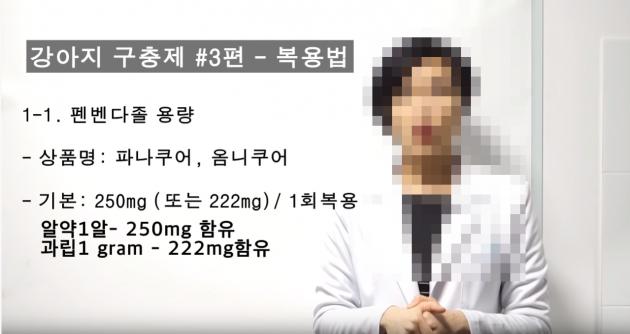Recently, several cancer patients were admitted to university hospitals due to side effects after taking deworming medicines and one of them died, amid growing concerns over cancer patients’ rush to take anthelmintic drugs to cure their disease.
A medical specialist’s YouTube video on how cancer patients should take fenbendazole, a dog dewormer, is increasingly causing controversy.

Defying the warning from the Korean Medical Association and the Ministry of Food and Drug Safety against the use of the dog dewormer for unexpected side effects, radiology oncologist Kim Ja-young claimed on her YouTube channel that it was safe to take fenbendazole. Her allegation immediately invited criticism from the medical community.
Kim uploaded the video clip titled “Is dog dewormer safe for human?” on YouTube on Oct. 7, after fenbendazole became a hot topic among cancer patients and physicians.
She cited four reasons why fenbendazole was safe for people.
According to Kim, fenbendazole has been proven to be safe for 40 years, and the human absorption rate of the drug is very low at 20 percent, making it difficult to show toxicity. Besides, the agent is toxic to lower organisms such as parasites, and less toxic to higher organisms such as humans and mammals, she said. Even if a patient takes fenbendazole for three consecutive days, rest for four days will release most of the drug ingredient, Kim claimed.
“Fenbendazole is a dog dewormer, while humans take mebendazole or albendazole. Their basic action is the same. The drug (fenbendazole) was developed in the early 1970s and has been proven to be safe for 40 years,” Kim said in the video.
If a patient takes 2,000 mg liquid fenbendazole at once, it has no acute side effects, and patients can purchase the human deworming drugs mebendazole and albendazole at a pharmacy, Kim said, emphasizing that they were all safe for humans.
“Regardless of whether the drug has an anticancer effect or not, it is a safe medicine,” she said.
Kim explained how to take the dog dewormer in detail. For a patient with rapidly progressing and multiple metastatic cancer, she recommended taking fenbendazole 222mg four times a day for three weeks, taking 222mg for once or twice a day after the third week, and giving a break for four days.
It was safe to use the high dose of fenbendazole because patients in the past took high doses of mebendazole, up to 2,000-3,000 mg for more than three weeks, when parasites were found in the brain, Kim went on to say.
She also detailed the amount of fenbendazole to take and the medication schedule for those who benefited from taking the drug.
To increase the absorption rate, patients should take the drug immediately after meals or take the deworming pill with 60-100cc olive oil so that bile can be secreted.
Kim’s video in three parts hit 60,000-180,000 views as of 3:00 p.m., Monday. Viewers left more than 500 comments on the videos, mostly thanking her for speaking up for cancer patients.
However, the medical community expressed concerns over Kim’s YouTube video.
“We can understand how progressive cancer patients and their families are desperate to take any measure if it has a little bit of chance to fight cancer. But a few cases of curing cancer with fenbendazole is weak evidence because they are based on personal experiences that have not been objectively validated through a group comparison in a clinical study,” KMA said.
The Korean Society for Radiation Oncology (KOSRO) said it was at a loss because of the YouTube video.
“We received a complaint about Kim’s video in October and internally reviewed the matter.
But it was not illegal for the physician to provide treatment, so we couldn’t officially order a disciplinary action or release an official statement,” said Lee Jong-hoon, director of general affairs at KOSRO.
The Ministry of Health and Welfare said it could not give Kim an administrative punishment just because of her YouTube content.
“Under the Medical Services Act, we can impose sanctions for providing false or exaggerated medical information on a broadcasting channel. But YouTube is not categorized as broadcasting under the broadcasting law,” an official at the health and welfare ministry’s healthcare resource policy division.
“The YouTube content about fenbendazole is quite confusing in terms of the Medical Services Act. Although the ministry does not consider punishing Kim for the YouTube video, we could review it if we receive an official complaint,” he added.

